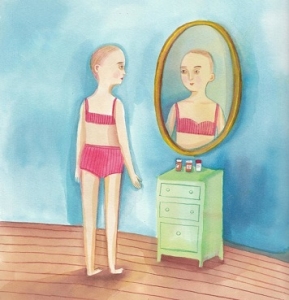
“During your cancer treatment, you have no control over your body — you give up your body to your doctor,” said Kathleen Emmets. “You are willing to do it because you want to live. Food restriction is the one thing that you can do to have some sense of control when everything is chaotic.”
Ms. Emmets, now 39, underwent cancer treatment for several years and as the treatment progressed her weight dropped. Although her figured looked hollow and emaciated all she could think was, “I’m finally skinny!”
Ms. Emmets, who has struggled with body image issues since her early 20’s, is not the only one whose cancer treatments have triggered or hidden an eating disorder. After she began writing about her experience with cancer and ED other women chimed in on her blog, The Manifest Station, with similar experiences.
One anonymous person wrote, “I have beat cancer but all I care about is losing that weight and keeping it off.” Another person, Doreen, felt like Ms. Emmets was uncovering something she had been hiding for years. She wrote, “You are sharing my little secret that I’ve carried around for years. I, too, used my cancer treatment as an excuse to practice my eating disorder. No one questioned why I wasn’t eating, why I was throwing up, why I was experiencing rapid weight lose.”
According to the journal article, Psychological Aspects of Anorexia in Cancer Patients, these women’s experiences are not uncommon. The article explains that anorexia is one of the most common symptoms of cancer and it represents one of the most difficult symptoms to treat.
Dr. Aminah Jatoi, an oncologist at the Mayo Clinic in Rochester, Minn., incorporates nutrition into her practice and says, “There needs to more research in these areas so that people are aware of patients’ histories when it comes to prior problems with eating, and finding ways to help them.”
Luckily, Ms. Emmets began therapy to address her cancer and eating disorder, however, she said her oncologist never asked her about her history with body image issues.
“It’s a real thing, an anomaly,” she said. “I think it needs not to be such a taboo topic.”
If you had/have cancer and are in recovery from an eating disorder, how did/would you prevent yourself from relapsing back into disordered eating?
####
About the author:
 Katie FitzGerald is the Director of Communications at Walden Behavioral Care. She earned her Bachelor of Arts degree in Communications from Framingham State University in Framingham, MA and her Master’s Degree in Journalism from Emerson College in Boston, MA. She is the editor of the Walden Blog and manages the company’s social media pages. Ms. FitzGerald enjoys exercising and wellness writing, and is passionate about using technology to help people with mental illness get the help they need.
Katie FitzGerald is the Director of Communications at Walden Behavioral Care. She earned her Bachelor of Arts degree in Communications from Framingham State University in Framingham, MA and her Master’s Degree in Journalism from Emerson College in Boston, MA. She is the editor of the Walden Blog and manages the company’s social media pages. Ms. FitzGerald enjoys exercising and wellness writing, and is passionate about using technology to help people with mental illness get the help they need.






